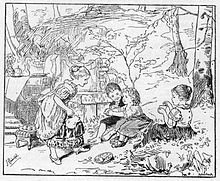| This article needs additional citations for verification. Please help improve this article by adding citations to reliable sources. Unsourced material may be challenged and removed. Find sources: "House" game – news · newspapers · books · scholar · JSTOR (August 2023) (Learn how and when to remove this message) |

House, also referred to as "playing house" or "play grown up", is a traditional children's game. It is a form of make-believe where players take on the roles of a nuclear family. Common roles include parents, children, a newborn, and pets.

The game often involves props, such as toy food. Additionally, dolls can play the role family members. Model houses and play kitchens are toys which are often specifically intended for playing house. The game is played both at home and in kindergarten or day care.
In other cultures
- In Chinese, the game is called "扮家家酒" or "过家家" (playing/living a family).
- In Dutch, the game is called "vadertje en moedertje" (little father and little mother).
- In German, the game is called "Mutter, Vater, Kind" (mother, father, child).
- In Hungarian, the game is called "papás-mamás" (fatherly-motherly).
- In Italian, the game is called "mamma casetta"(mother little home).
- In Japanese, the game is called "ままごと"(playing cooking).
- In Persian, the common term (خاله بازی or مامان بازی) means "mother play" or "auntie play", highlighting that the game is stereotypically played by girls.
- In Russian, the game is called дочки-матери (daughters-and-mothers).
- In Swedish, the game is called "Mamma, pappa, barn" (mother, father, child).
- In Spanish, the game is often called "jugar a la casita/familia" (playing House/Family).
- In Hindi, the game is called "ghar-ghar" (house-house)
- In Thai, the game is called "พ่อแม่ลูก" (father, mother, child).
See also
References
- Luo, Yintang (1 January 2018). 慈溪民俗 [Customs of Cixi] (in Chinese). Ningbo Publishing. pp. 298–299. ISBN 978-7-5526-3171-5.
This game-related article is a stub. You can help Misplaced Pages by expanding it. |

